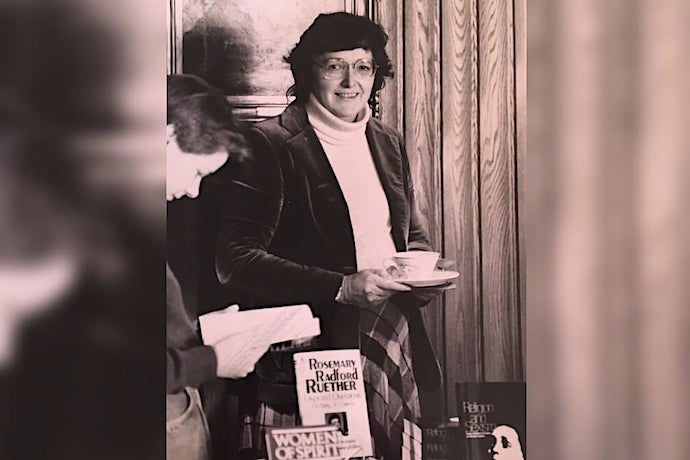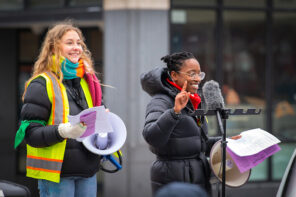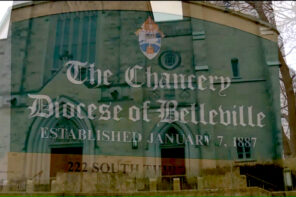Theologians will tell you that Catholic theology almost always favors both/and scenarios, yet the U.S. Catholic bishops’ crusade against abortion results in nothing but either/or positions. Take, for instance, the bishops’ newly favored form of public humiliation for Catholic politicians who support legal abortion: dangle the communion host like a carrot tied to a string.
On May 20, San Francisco Archbishop Salvatore Cordileone announced that House Speaker Nancy Pelosi, a practicing Catholic who’s long championed access to abortion care, is now barred from receiving the eucharist until she publicly renounces her pro-choice stance and subsequently receives absolution for “this grave sin in the sacrament of Penance.” In an interview with America magazine’s Gloria Purvis, Cordileone argued that Pelosi’s increasingly “aggressive” campaign to codify abortion into law, in the event that Roe falls, warranted this imposition.
Denying a person communion—a sacrament that Catholics believe is both representational and the literal body and blood of Jesus Christ—is a form of censure in the Catholic Church. Bishops usually cite Canon 915, a provision of the church’s Code of Canon Law that stipulates that any Catholic the hierarchy formally declares excommunicated or “manifesting” grave sin may not receive communion. The following canon, 916, states that any Catholic who “who is conscious of grave sin” can’t receive communion either. And in the current edition of the Catholic Catechism, “procuring” abortion—which could mean anything from terminating a pregnancy to volunteering as a clinic escort to driving a friend to Planned Parenthood—is grounds for automatic excommunication. However, this penalty against anyone who “procures” an abortion (Canon 1398) is a fairly recent revision, only dating back to the 1983 Canon Code reforms, when both the Vatican and the U.S. hierarchy were presented with growing political and social challenges to their opposition to reproductive rights.
I can’t help but think it’s some sort of tragic irony that Rosemary Radford Ruether, a founding mother of feminist theology, passed away on May 21 at age 85, just a day after Cordileone’s announcement. Ruether lived through this fraught both/and scenario for most of her scholar-activist career. No stranger to dissent, Ruether publicly supported legal abortion as well as other reproductive health services that the Vatican considers unlawful, such as contraception use for preventing HIV and AIDS. Her decades-long tenure on the board of Catholics for Choice—first as a member and later, a member emerita—cost her employment at Catholic institutions, including an endowed chair at the University of San Diego. She understood that the theological was indeed political.
Ruether located reproductive politics as the site of modern-day tensions between the Catholic Church and gender-marginalized people. The liberative spirit of the Second Vatican Council (1962-1965) transformed public life for American Catholics, energizing both clergy and laypeople to engage in social activism. Some Catholics viewed the push to repeal abortion laws—emerging from the second-wave feminist movement—as a prophetic call. When these coinciding movements clashed, Ruether claimed the results negatively impacted Catholic theology, for “traditional Catholic views on women’s gender roles and sexuality and reproduction became joined.”
Yet dissent among Catholics on reproductive health issues persisted: Lay Catholics embraced the Pill and had abortions at rates higher than their Protestant counterparts while Catholic theologians debated the Church’s stringent teachings on contraception and pregnancy terminations.
In October 1984, Ruether joined nearly 100 theologians, ethicists, politicians, and ordained persons in signing “A Catholic Statement on Pluralism and Abortion.” Sponsored by Catholics for Choice (then known as Catholics for a Free Choice), the full-page New York Times advertisement declared “a diversity of opinions regarding abortion exists among committed Catholics.” Many theologians, the statement read, believed abortion “can sometimes be a moral choice.” Feminist theologian Margaret Farley, novelist Mary Gordon, and then-New York Gov. Mario Cuomo were among the signers. More than two dozen ordained persons also endorsed the statement: 24 nuns (including Farley, member of Sisters of Mercy), three brothers, and moral theologian Father Charles Curran as the lone Catholic priest.
Although the statement was not unequivocal in its stance on abortion, it was deliberate in its challenge of the teaching authority of the American bishops. Ruether later explained in “Catholics and Abortion: Authority vs. Dissent,” published in The Christian Century in 1985, that this truly was a “defense of Catholic legislators’ right of public dissent on abortion.” Catholic theologians and CFFC associates previously discussed making public statements, but it was the U.S. bishops’ targeted harassment of Rep. Geraldine Ferraro (D-N.Y.) that motivated this act of solidarity.
When a Catholic politician has sway over the national Catholic voting bloc, the bishops pay attention; when a Catholic politician with national influence supports legal abortion, it gets personal. In 1984, Ferraro became the first woman and Italian American to appear on a presidential ticket. A Catholic, Ferraro had ruffled the cassocks of some members of the hierarchy—specifically, then-New York Archbishop John O’Connor.
Earlier in her congressional career, Ferraro worked with Catholics for a Free Choice in fostering discussions among her fellow Catholic members of Congress. Ferraro herself supported abortion rights but personally adhered to the Church’s teaching. In a short introduction to a CFFC pamphlet, tailored to Congressmembers, Ferraro acknowledged “the Catholic position on abortion is not monolithic and that there can be a range of personal and political responses to the issue.”
O’Connor and his circle of bishops allegedly weren’t too concerned about Ferraro’s position until Walter Mondale chose her as his running mate. Only then did the bishops amp up their campaign against Ferraro. In August 1984, the bishops’ conference, then led by Bishop James Malone of Ohio, released a statement aimed at Ferraro and other public dissenters, including Mario Cuomo, though they didn’t refer to any politicians by name. The bishops claimed they needed to correct what they saw as an impossible, fallible stance, that “this implied dichotomy—between personal morality and public policy—is simply not logically tenable.” The real trouble with Catholic politicians like Ferraro and Cuomo, Pelosi and Joe Biden, in other words, is their public support of abortion care and their status as Catholics. The latter is a status whose increasing political capital has much to gain—and to lose.
Are we witnessing history repeat itself or are the 21st century communion-abortion wars the obvious trajectory of the bishops’ control over American Catholics in public life? The 1984 New York Times statement didn’t rock the national political arena as much as the current communion fights do, which is actually a testament to how much the bishops’ conference and Catholic politicians have grown in power (with the House speaker, the president, and the majority of the Supreme Court now identifying as Catholic).
But the fallout from the 1984 statement does set the stage for the current political and theological climate. A wave of employment terminations and admonishments followed the statement’s publication; theologians lost their jobs (even tenured positions, in the case of Father Curran, who the Vatican declared unfit to teach Catholic theology); religious sisters were staving off excommunication; and the Vatican intensified its penalties for supporting abortion, whether publicly as a theologian or politician, or quietly as an ordinary lay Catholic. By 1985, Ruether noted that the tide was changing: For both the Catholic hierarchy and laypeople, this was no longer about “the question of pluralism on abortion,” but the “right of dissent itself.”
It’s worth noting that the Vatican’s most conservative members at the time—including Pope John Paul II and Cardinal Joseph Ratzinger, the future Pope Benedict XVI—did not gain everything they wanted. There were concerns that the Vatican would declare Humanae Vitae, the 1968 encyclical reaffirming the church’s ban on artificial contraception and abortion, “infallible.” The infallibility of that document—as well as other papal documents on issues of sexuality and reproduction—is still debated. If those teachings are not considered infallible, then, theologians such as Ruether and Curran argued, Catholics can dissent against the church and remain in good faith, even on the issue the bishops have chosen as the singular litmus test of Catholic identity.
Yet perhaps the either/or position is unavoidable now for American Catholics: At a time when Roe will likely fall, and Catholics have substantial representation in the legislative, judicial, and executive branches, the choice to remain silent carries almost as high stakes as the choice to dissent.





